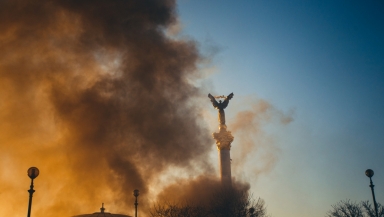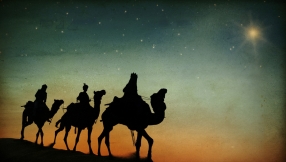
As I write this, it is "Day 146" of the war in Ukraine. It started in February, as what Vladimir Putin clearly thought would be a short "special operation," and has turned into a prolonged and bloody conflict.
Already commentators are describing it as a "forever war," a conflict which neither side can win; one which turns into an ongoing slogging match in which casualties mount, economies are distorted, but no decisive action can bring it to a close.
Picture the Western Front of the First World War in miniature: attritional battles, moments of geographical mobility, but no decisive blow being landed by either side.
Alternatively, it may become a "frozen conflict." One in which Russia reaches the furthest extent of the land grab it is capable of; while Ukraine, armed by the West, stops further advances and will (understandably) not accept the loss of territories. The division could become "frozen." And what then?
The current situation – the "temperature" increases
In the third week of July – as temperatures soared across the UK and much of Europe – the "political temperature" has also increased. Continuing Russian missile attacks on Ukrainian cities have clearly been designed to test the resolve of the Ukrainian people and its government. Civilian casualties have again mounted.
At the same time, President Zelensky has appointed an experienced security official as acting head of the domestic security agency (the SBU), due to suspected Russian intelligence infiltration of key ministries. It is a situation which reminds us of the capabilities of the Russian security services to interfere in the affairs of other states and to follow a policy of encouraging instability.
In Ukraine the possibility of this is enhanced by a long history of interconnectedness between the two states, which has afforded the Russian security services plenty of time to place and develop sleeper agents and encourage pro-Russian sentiments.
In the same week, the news broke that Russia's Gazprom organisation has told customers in Europe that it cannot guarantee future gas supplies. On Thursday, Gazprom will decide whether to resume its supplies to Europe, after the annual scheduled maintenance break has been completed on the Nord Stream 1 pipeline. The situation does not look encouraging regarding this. Russia has already ceased supplying gas to Bulgaria, Finland, the Netherlands, and Poland; and it has reduced supplies to eight other nations.
Looking forward to the winter, from a current situation when energy prices are already soaring, the threat is clear. It is intended to increase energy costs, as a deliberate act designed to make Western economies and ordinary consumers pay a price for the support given to Ukraine.
This is feeding into a cost-of-living crisis that threatens political stability across Europe. This week we are seeing political turmoil in Italy, where Mario Draghi faced a confidence vote on Wednesday - he won but resigned nonetheless. Draghi's foreign minister, Luigi di Maio, suggested that Putin would welcome the fall of another Western government.
This latest turbulence has added to the ongoing political instability in France, Spain, Bulgaria, and Estonia. In France, the far-right has long contained those favourably inclined towards Putin. In Estonia, the strongly anti-Putin prime minister, Kaja Kallas, survived last week, although her previous coalition government fell. This was significantly due to Estonia's inflation rate of 19%. This is the highest in the 19 nations in the eurozone. To this we could add the continuing fallout from Brexit in the UK, which is still souring its relationship with the EU (a situation welcomed by Putin).
These things, of course, have their own domestic "drivers," and this cannot be ignored. Putin has not orchestrated them, but he has contributed to many of them. And the cost-of-living crisis is a major factor in the present turbulent situation – and Putin is doing his best to accelerate that and to amplify its effects. For the Russian president, soaring fuel prices are a macroeconomic weapon because they drive inflation, while slowing economic growth in the countries experiencing this.
At the same time the disruption to grain supplies, fertilisers and other agricultural products from Ukraine and Russia has caused a massive hike in global food prices. On this front though, there may yet be some improvement in supplies, due to ongoing negotiations between Russia and Turkey concerning shipping through the Black Sea, which are continuing this week. On this front, Russia is less willing to hold a gun to the heads of consumers as it is having a particular impact on states that are not involved in the Western actions against Russia and Putin clearly fears a backlash from such nations.
While all this has been building, Russian offensives grind on, aimed at securing advances in the Donetsk region, as part of its strategy for enlarging the area of the Donbas under its military control. However, the casualty rates, as a consequence of these offensives, are falling disproportionately on poorer Russian regions (where military recruitment is disproportionately high). In the long term, this is a socially dangerous factor that should worry the Putin regime, as the USSR found with mounting casualty figures in its "forever war" in Afghanistan.
As a sign of the likely political future of these occupied areas, responsibility for key cities and parts of Ukraine taken by Russia are being given to political (Putinist) local bosses who have power bases within the Russian Federation. This is an indication of Russian determination to connect these areas to Russia and probably to permanently annex them in due course.
It is also a policy from Putin's playbook, which devolves difficult decisions onto local bosses within the Russian system, so that they are held responsible for anything that goes wrong in the policy, while the Kremlin reaps the benefits of policies that work out as planned. Putin did the same with his response to Covid-19.
Finally, Ukraine promises a million-person mobilisation. This is unlikely to actually occur (if by that we mean the number of armed persons actually deployed to the conflict zones), since it would absorb just about every Ukrainian police officer, border-guard, etc, but it is a sign of the determination of Ukraine to continue this war that has become an existential threat to it as a nation.
In a very hot summer, the "political temperature" is going up higher.
Where does this leave the West?
I believe that the West must maintain support for Ukraine because what is currently going on, as a result of Russian aggression, is a challenge to the whole international rules-based system; and the basic moral, political, and civic values that underpin democratic states.
However, there is no doubt that this support comes at a price. Putin has "bet the farm" on this military operation (that he cannot even bring himself to call "a war"), and in this game of high-stakes poker he is banking on Western resolve weakening before that of Russia.
This is a common feature of authoritarian states when they face off against democracies. Lacking the immediate push-back of a disgruntled population – expressing its unhappiness through the ballot box and a free media – they count this as the Achilles' heel of democracies. In short, Putin thinks that the weakest link in the resolute stance of the West is us, the ordinary consumer and voter in the democratic system. To prove him wrong we may have to "dig deep" as we stand our ground.
At home, Putin's stage-managed form of democracy (which, at one time, possessed some features whereby voters could express dissatisfaction) has now morphed fully into an authoritarian state. The security agencies are stronger than ever; dissenting voices are silenced, as we have seen in the rapid arrests of those offering even the slightest protest; what opposition parties that still exist have been crushed, muted, or are self-censoring.
Yet Putin may have finally overplayed his hand. If Western Europe can wean itself off reliance on Russian gas and oil, the Russian president will have played and expended his major card. He really will have "bet the farm" and found his bluff has been called.
While this is happening, it is imperative that diplomatic pressure be kept up on states that still deal with Russia. This is principally China – but there are others.
We must work hard to apply sanctions to Russian political elites not ordinary Russians; and use all available means to communicate to ordinary Russians that the struggle is not with them. And we must encourage more skilled Russians to leave Russia as is already happening.
Finally, we must pray for regime change in the Kremlin. But we cannot make it happen. Such externally sponsored regime-change rarely works and has a history of backfiring badly. That is something we must leave to the Russians. As their economy falters and their military degrades, it is a real possibility – although not likely to happen in a hurry.
Martyn Whittock is an evangelical historian and a Licensed Lay Minister in the Church of England. As the author, or co-author, of fifty-four books, his work covers a wide range of historical and theological themes. In addition, as a commentator and columnist, he has written for several print and online news platforms; has been interviewed on radio news exploring the interaction of faith and politics; appeared on Sky News discussing political events in the USA; and recently has been interviewed regarding the war in Ukraine, including its religious dimensions. His most recent books include: Trump and the Puritans (2020), Daughters of Eve (2021), Jesus the Unauthorized Biography (2021), The End Times, Again? (2021) and The Story of the Cross (2021). In The Secret History of Soviet Russia's Police State (2020)he explored how the repressive history of Russia in the twentieth century has influenced the development of Putin's police-state. He has just completed Apocalyptic Politics (2022 forthcoming), which examines apocalyptic beliefs driving political radicalization across global cultures, including in Putin's Russia.













